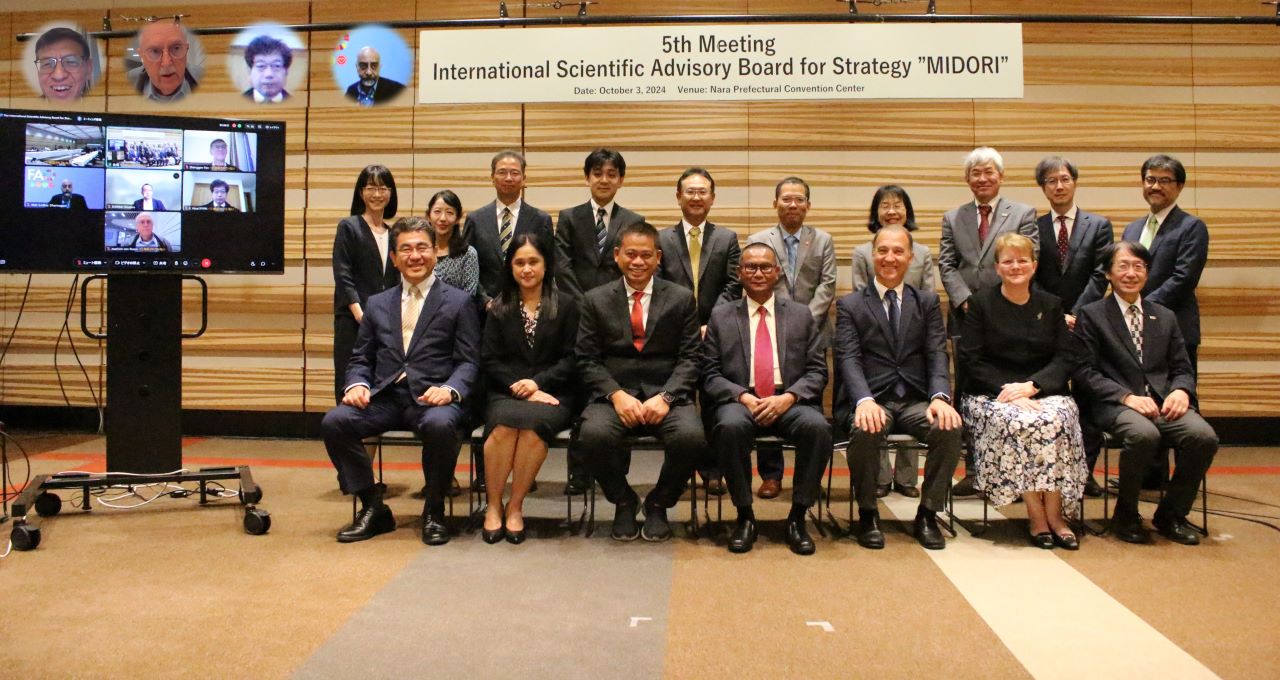The 5th Meeting of the International Scientific Advisory Board for Strategy “MIDORI”
On October 3, 2024, the fifth meeting of the International Scientific Advisory Board was held at the Nara Convention Center (Nara City, Japan). Mr. Koyama, President of JIRCAS, and Mr. Shinobu, Deputy Director General of the Agriculture, Forestry and Fisheries Research Council, provided the opening remarks. Mr. Shinobu welcomed the participation of the ASEAN Secretariat as an observer in the advisory committee and expressed his gratitude for the efforts made by the advisory committee to date for the dissemination of technology and his expectations for the future. Then, the ASEAN Secretariat and ERIA shared information on ASEAN's priorities in the food and agriculture sectors, with a particular focus on science and innovation, while the Ministry of Agriculture, Forestry and Fisheries (MAFF) explained the progress of the "Strategy MIDORI" and the "ASEAN-Japan MIDORI Cooperation Plan".
Next, the advisory committee secretariat (JIRCAS) announced that "Technology Catalog Contributing to Production Potential and Sustainability in the Asia-Monsoon Region", developed under this project, has recently been added to the website of the Food and Agriculture Organization of the United Nations (FAO), as well as the websites of the United Nations Food Systems Coordination Hub and the ASEAN Secretariat. Then, the Secretariat introduced a draft of Technology Catalog Ver. 3, explaining that it could be released soon. The Secretariat also reported on the progress of demonstration tests on the use of intermittent irrigation technology, biological nitrification inhibition (BNI)-enhanced wheat, and the international differential system for rice blast control, which have been conducted under Green Asia. The Secretariat asked the advisory committee for their opinions on measures to further promote the implementation of technologies listed in Technology Catalog, focusing on technologies that have received significant interest from ASEAN countries.
In response to the above, the advisory board members highly appreciated the progress of Green Asia, especially Technology Catalog, and commented as follows.
- We need to pay attention to aspects such as social, regional, market, and economic feasibility for the dissemination of technology, and necessary matching should be carried out.
- To overcome barriers to the dissemination of technology, we should work closely with IRRI and other CGIAR institutes from the perspective of cooperation with financial institutions.
- Addressing barriers to technology diffusion requires a social science approach.
- Since the spread of scalable technologies is a supply-driven approach, it is important to consider combining it with a demand-based approach.
- In addition to comments that contribute to the future direction of Green Asia's activities, the advisory committee provided some specific comments such as:
- Regarding technology to reduce methane emissions from beef cattle by providing cashew nut shell liquid, discussion with the livestock departments of interested countries on the possibility of introducing the technology is necessary. Furthermore, even if there is little interest in the government since there are similar technologies already in existence, it may be possible to disseminate the technology through joint research with research departments and through case studies.
Finally, the ASEAN Secretariat stated that Green Asia will support the ASEAN-Japan MIDORI Cooperation Plan. The ASEAN Secretariat also stated that it looks forward to working together with JIRCAS and the members of the advisory board on ASEAN's priorities in the future.

